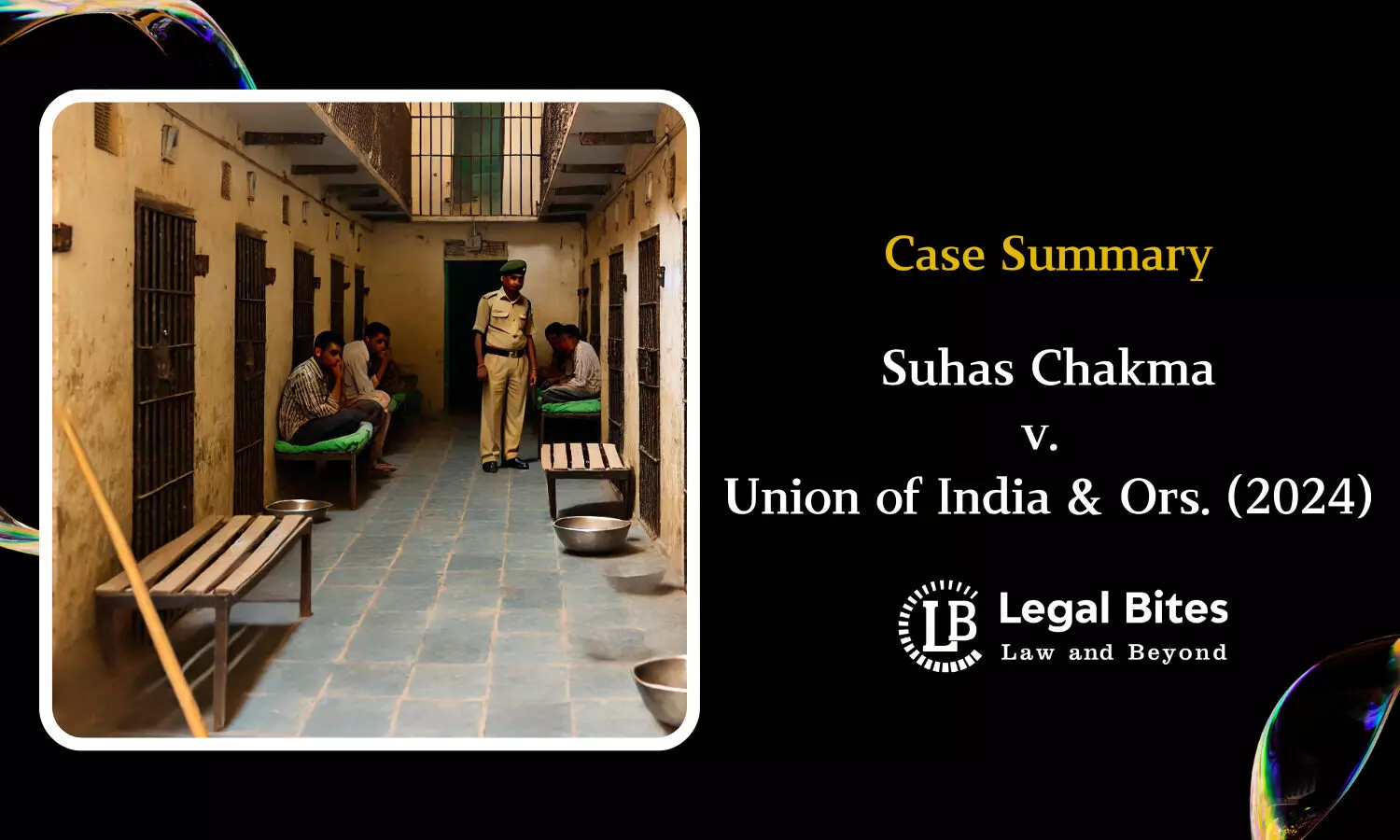Case Summary: Suhas Chakma v. Union of India & Ors. (2024) | Supreme Court Orders Measures to Enhance Legal Aid for Prisoners
In Suhas Chakma v. Union of India & Ors., the petitioner sought Supreme Court intervention to address prison overcrowding and inadequate legal aid.;

This case focuses on prisoners' rights under Articles 21 and 39-A, with Suhas Chakma filing a writ petition under Article 32 to address overcrowded prisons and inadequate legal aid.Case Title: Suhas Chakma v. Union of India & Ors.Court: Supreme Court of IndiaCitation: Writ Petition No. 1082 of 2020Judge: BR Gavai (J), K.V. Viswanathan, (J)Judgment on: 23rd October, 2024Brief FactsThe petitioner filed a writ petition under Article 32 of the Constitution, seeking the Supreme...
This case focuses on prisoners' rights under Articles 21 and 39-A, with Suhas Chakma filing a writ petition under Article 32 to address overcrowded prisons and inadequate legal aid.
Case Title: Suhas Chakma v. Union of India & Ors.
Court: Supreme Court of India
Citation: Writ Petition No. 1082 of 2020
Judge: BR Gavai (J), K.V. Viswanathan, (J)
Judgment on: 23rd October, 2024
Brief Facts
The petitioner filed a writ petition under Article 32 of the Constitution, seeking the Supreme Court's intervention to address inhumane conditions in Indian prisons caused by overcrowding and lack of hygiene, arguing that this violated prisoners' rights under Article 21. The petition also highlighted the absence of adequate legal aid for indigent prisoners, emphasizing the need for free legal services as per Article 39-A.
The Court, with assistance from Amicus Curiae and the National Legal Services Authority (NALSA), examined ways to improve legal aid access for prisoners and considered the establishment of mechanisms to decongest prisons while ensuring that prisoners’ dignity and constitutional rights are upheld.
Issues
- Whether overcrowded and unhygienic prison conditions violate Article 21 of the Constitution, which guarantees the dignity and right to humane treatment of prisoners, as overcrowding leads to inhumane and degrading conditions.
- Whether prisoners have adequate access to legal aid, particularly for those unable to afford private counsel, and whether the state is fulfilling its obligation to provide free legal services under Article 39-A, which promotes equal justice for all.
- Whether the existing legal aid mechanisms are effective in ensuring timely and sufficient legal representation for prisoners, particularly undertrial inmates, or if there is a need for a more streamlined and functional system to prevent prolonged detention.
- Whether the establishment of open correctional institutions can serve as a feasible solution to alleviate overcrowding in prisons, addressing both humanitarian and legal concerns for prison reform.
Judgment
The Supreme Court issued several significant directions to address the issues raised:
- Recognition of Overcrowding in Prisons: The Court acknowledged the dire conditions in prisons across India and reiterated the need for humane treatment of prisoners.
- Free Legal Aid as a Fundamental Right: The Court reinforced that legal aid is not merely a statutory provision but a fundamental right under Article 21. Legal aid must be made available to indigent prisoners without their asking.
- Role of Legal Services Authorities (NALSA): The judgment extensively discussed the role of the National Legal Services Authority (NALSA) in providing free legal aid to prisoners. The Court appreciated NALSA’s efforts and directed it to strengthen the legal aid mechanism.
- Standard Operating Procedures (SOPs): NALSA's 2022 SOP on providing prisoners legal aid was highlighted. The Court endorsed the SOPs to ensure legal representation at every stage of criminal proceedings and directed their efficient implementation.
- Role of Jail Visiting Lawyers (JVLs) and Paralegal Volunteers (PLVs): The Court directed the active involvement of JVLs and PLVs in ensuring that prisoners receive timely legal representation and are informed of their rights.
- Strengthening Legal Aid Defense Counsel System: The Court praised the Legal Aid Defense Counsel System, which provides dedicated, full-time legal representation to indigent prisoners, and emphasized the need for its effective implementation in all districts.
- Monitoring and Awareness: The Court mandated regular monitoring of prison legal aid clinics and directed the legal services authorities to spread awareness of free legal aid schemes in local languages and through innovative methods.
To create awareness about legal aid, the Court suggested the following measures:
- Display boards with contact details of the nearest legal aid office in public places like police stations, post offices, and railway stations, in both local languages and English.
- Launch promotional campaigns in local languages via Radio, All India Radio, and Doordarshan, alongside digital initiatives such as prominently featuring legal aid information on websites.
- Use creative methods like street plays (nukkad natak) in rural areas to raise awareness, ensuring these activities inform both the accused and victims about legal aid without disrupting daily life.
The Supreme Court suggested that High Courts consider directing all courts to include a coversheet with judgments related to conviction, dismissal, acquittal reversal, or bail rejection. This coversheet would inform convicts about the availability of free legal aid for appeals and provide contact details of the legal aid committee for assistance.
Conclusion
The Supreme Court’s judgment in Suhas Chakma v. Union of India reinforced the principle that prisoners, regardless of their status, are entitled to humane treatment and effective legal representation. The Court's directives aimed at improving prison conditions, decongesting overcrowded prisons, and ensuring access to free legal aid were a significant step toward realizing the constitutional goals of justice and equality.
The case reaffirms that the dignity of individuals, even those in detention, is inviolable under the Indian Constitution, and legal aid is not just a statutory right but a fundamental one under Article 21.
Click Here to Read the Full Judgment





